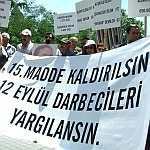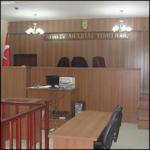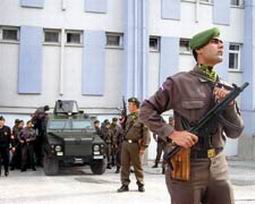Following a decree by the 9th Penal Chamber of the Supreme Court of Appeals, the Van 3rd Penal Court last week sent the Semdinli case to a military court last week.
The Semdinli case is concerned with the bombing of a bookshop in Semdinli, in the southeastern province of Hakkari, in November 2005. After the bombing two noncommissioned officers and a PKK informant were arrested.
Crime committed "on duty"
In its decision of 16 May, the Supreme Court of Appeals justified the transfer of the case to a military court with the fact that two of the accused, junior officers Ali Kaya and Özcan Ildeniz, were accused of a crime which would have been committed "on duty".
However, retired military judge and a lawyer at Istanbul Bar Association Ümit Kardas and human rights law specialist lawyer Mehmet Nur Terzi have disputed this justification.
Kardas: Limit military courts to discipline issues
Kardas says that although the military courts are given a wide range of duties in domestic law, the military judiciary should be limited to issues related to internal discipline:
"Letting this case be heard by a military court contravenes the natural principle of the judiciary and the unity of trial."
Terzi: Impartial trial impossible
For Terzi, the transfer to a military court represents a violation of the principle of impartial trials:
"There are no independent soldiers. This is an issue of human rights. The European Court of Human Rights (ECHR) has decreed many times that decisions made by the military judiciary, particularly the State Security Courts, cannot be indepedent and neutral. Whatever internal law says, the European Convention on Human Rights and the ECHR need to validate the decisions."
Terzi argues that crimes that soldiers commit against each other also need to be dealt with by civil courts. "If a soldier kills another, hurts him/her, or steals from him/her, the trial has to take place in a civil court. For instance, former Marine Commander Ilhami Erdil [tried for unjust enrichment in a military court and then sentenced to 2 years 6 months imprisonment] should also have been tried in a civil court."
Dogru and Elci: Plaintiffs and defendants need impartial trial
Prof. Dr. Osman Dogru, of the Law Faculty at Marmara University (Istanbul), explains the contravention of the principle of an impartial trial as follows:
"The ECHR says that if a civilian is tried by a court which includes members of the military,then the defendant may have doubts about the impartiality of the court. An impartial trial is also important for the plaintiffs. First of all, the defendant needs to be tried fairly. If the trial is not impartial, then the crime will not transpire, and then the aggrieved parties cannot claim compensation."
Tahir Elci, one of the trial lawyers, commented on the decision of the Supreme Council of Appeals: "The principle of an impartial trial is also valid from the perspective of the aggrieved parties. You cannot believe that a case where the rights of civilians in a civilian space were violated by soldiers can be tried impartially by a military court."
Terzi: "A military republic"
Terzi has pointed to Turkey's two-headed judiciary (i.e. a civil and a military judiciary) as the essence of the problem: "This means a military republic. The military is reserving the right to sentence their own, and this damages democracy. They have the potential to try anyone they see as a threat. This is the same as saying, 'We will try whoever we want, but you cannot try us.'" (TK/AG)














